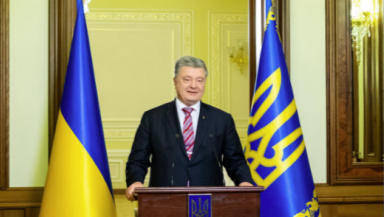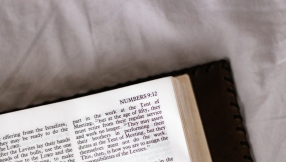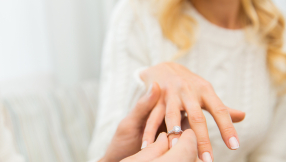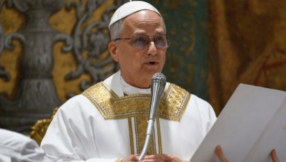President Petro Poroshenko said on Thursday Ukraine was on the cusp of securing its own independent church, snapping centuries-old ties to a Russian clergy that Kiev accuses of meddling in its affairs.
Poroshenko's comments came after the Ecumenical Patriarchate in Istanbul, home to the global spiritual leader of Orthodox Christians, announced it had drafted a constitutional charter for an 'autocephalous', or self-governing, Ukrainian church.

Ukraine's push to create an independent church has incensed Moscow at a time of escalating crisis between the two neighbours following Russia's capture of three Ukrainian vessels that Kiev fears may be a precursor to a full-scale invasion.
Relations collapsed following Russia's seizure of Crimea from Ukraine in 2014 and the outbreak of a Kremlin-backed insurgency in eastern Ukraine that has killed more than 10,000 people.
'Today, at the Holy Synod of the Ecumenical Patriarchate, historical decisions have been taken on the creation of an autocephalous Ukrainian Orthodox Church,' Poroshenko said in a televised address.
Ecumenical Patriarch Bartholomew will soon announce when the Ukrainian clergy is to meet to pick the head of the new church, Poroshenko added.
Earlier, the Ecumenical Patriarchate said in a statement that 'the Holy and Sacred Synod drafted the Ukrainian Church's Constitutional Charter'.
Church rivalry
Ukraine had sought the Ecumenical Patriarchate's consent to establish an independent church and won its backing in October, prompting the Russian Orthodox Church to break off diplomatic ties with the Istanbul-based Patriarchate.
Ukraine's leadership accuses the Moscow-backed faction of the Ukrainian Orthodox Church, widely known as the Moscow Patriarchate, of being a tool of the Kremlin to spread Russian propaganda and foster Russian expansionism.
The Moscow Patriarchate strongly denies this and says it is working to promote peace in Ukraine.
Russia accuses Poroshenko of manufacturing crises, both on the church issue and in the naval standoff that erupted on Sunday, in order to whip up Ukrainian national pride and boost his sagging popularity ahead of elections next March.
Poroshenko said Russia had tried to thwart Ukraine's bid for church independence but added: 'The Lord was with us because we are leading a righteous struggle for our independence.'
Ukraine and Russia trace their Orthodox Christian roots to Volodymyr the Great, the prince whose baptism in 988 in Kiev led to the christianisation of the region known as 'Kievan Rus'.
Two large Orthodox Churches compete for influence in Ukraine.
The Moscow Patriarchate, which is aligned with the Russian Orthodox Church, earlier dominated in Ukraine but has been challenged by a rival, known as the Kiev Patriarchate, formed after the 1991 break-up of the Russian-dominated Soviet Union.
Support for the Kiev Patriarchate swelled after the annexation of Crimea. It supports church independence and Ukraine's closer integration with the West.













